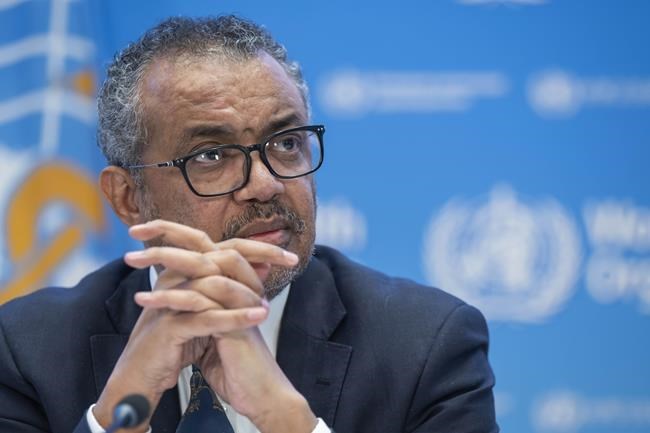OTTAWA — On Monday, exactly three years from the day he declared COVID-19 to be a global public health emergency, World Health Organization director-general Tedros Adhanom Ghebreyesus will decide whether to call it off.
But declaring an end to the "public health emergency of international concern" would not mean COVID-19 is no longer a threat. It will also not do much to change Canada's approach.
"In Canada, we're already doing what we need to do," chief public health officer Dr. Theresa Tam said in her most recent COVID-19 update.
She said the WHO discussion is important but COVID-19 monitoring and public health responses are not going to end. That includes continued surveillance of cases, particularly severe illness and death, and vaccination campaigns.
The WHO's emergency committee, which was struck in 2020 when COVID-19 first emerged as a global health threat, voted Friday on whether to maintain the formal designation of a public health emergency.
Tedros will make the final call Monday based on the advice the committee gives him.
He warned earlier this week that he remains concerned about the impact of the virus, noting there were 170,000 deaths from COVID-19 reported around the world in the last two months.
"While I will not pre-empt the advice of the emergency committee, I remain very concerned by the situation in many countries and the rising number of deaths," he said Jan. 24.
"While we are clearly in better shape than three years ago when this pandemic first hit, the global collective response is once again under strain."
He is worried not enough health-care workers or seniors are up to date on vaccinations, that access to antivirals is limited and that health systems around the world remain fragile following three years of pandemic strain.
In Canada, there was a noticeable rise in cases, hospitalizations and deaths over Christmas and early in January but all are trending down again. Tam said there were no surges of the virus anywhere in Canada, though the latest variant of Omicron was being watched closely.
Federal surveillance data shows more than 30 people are still dying of COVID-19 every day, and hundreds of people are still hospitalized.
The formal designation of the global public health emergency was made on Jan. 30, 2020, when 99 per cent of confirmed COVID-19 cases were still restricted to China.
The decision was made to declare an emergency because human-to-human transmission was starting to occur outside China, and the hope was that by designating an emergency it could prompt a public health response that could still limit the impact of COVID-19.
That did not happen. On March 11, 2020, Tedros declared a global pandemic, practically begging countries to do more to slow it down.
The declaration of a pandemic meant that there was exponential growth in the spread of the virus.
By WHO terminology, a "public health emergency of international concern" is the highest formal declaration and the one which triggers a legally binding response among WHO member countries, including Canada.
It is what is done when a health threat is "serious, sudden, unusual or unexpected," when it carries global public health implications and may require "immediately international action."
A designation prompts the WHO director-general to issue recommendations for member countries including increased surveillance to identify new cases, isolating or quarantining infected people and their close contacts, travel measures such as border testing or closures, public health communications, investments in research and collaboration on treatments and vaccinations.
Dr. Sameer Elsayed, an infectious diseases physician and the director adult infectious diseases residency training at Western University in London, Ont., said to his mind the WHO should end the global emergency designation even though the pandemic itself is not over.
"I don't know that we should continue to call it an emergency," he said. "I hope they say that we're going to bring it down a notch."
Elsayed said for vulnerable populations, including the elderly and those with compromised immune systems, COVID-19 continues to pose a serious threat, but for most people there are far bigger threats, including suicide. He said with limited health resources, COVID-19 needs to be put in its proper place alongside other health issues.
Children, in particular, said Elsayed, are much more at risk from influenza and RSV than COVID-19 in wealthy countries, and from food insecurity and the lack of access to clean water in many developing nations.
Tam said regardless of what WHO decides, Canada won't stop monitoring the evolution of the virus that causes COVID-19, including for new variants that may require adjustments to vaccines or other treatments.
She also said we must continue to monitor the ongoing developments in long COVID.
"We mustn't, I think, let go of the gains that we've had in the last several years," she said.
"I think whatever the decision is made by the director-general of WHO, I think we just need to keep going with what we're doing now."
This report by The Canadian Press was first published Jan. 27, 2023.
Mia Rabson, The Canadian Press

